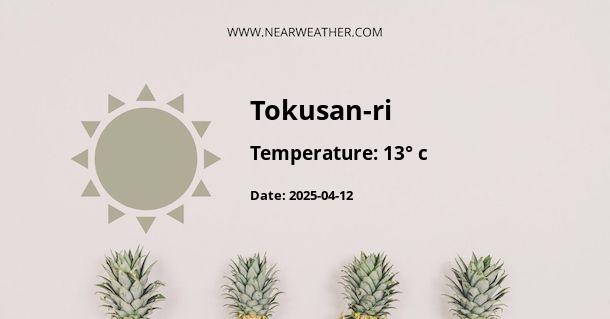Tokusan-ri, South Korea: Climate and Weather Year Round
Tokusan-ri is a small village located in South Korea. Situated in the province of Gyeongsangnam-do, Tokusan-ri experiences a temperate climate with distinct seasons throughout the year. The region is known for its picturesque landscapes, rich cultural heritage, and diverse weather patterns. Understanding the climate and weather patterns of Tokusan-ri is essential for both residents and visitors to plan their activities and make the most of their time in this beautiful location.
Temperature
The temperature in Tokusan-ri varies significantly throughout the year. Summers in Tokusan-ri are generally warm and humid, with average temperatures ranging from 22°C (72°F) to 28°C (82°F). The hottest months are July and August, with temperatures occasionally reaching above 30°C (86°F). It is advisable to dress lightly and drink plenty of water to stay hydrated during this time.
Winters in Tokusan-ri are cold, with average temperatures ranging from -3°C (27°F) to 5°C (41°F). The coldest months are January and February, with temperatures occasionally dropping below freezing. Warm clothing, including jackets, scarves, and hats, is necessary to stay comfortable during the winter months.
Precipitation
Tokusan-ri experiences moderate rainfall throughout the year. The wettest months are July and August, with an average precipitation of around 200mm (8 inches) per month. These months are also associated with occasional thunderstorms. It is advisable to carry an umbrella or raincoat during this period.
Spring and autumn in Tokusan-ri are relatively dry, with average monthly rainfall ranging from 50mm (2 inches) to 100mm (4 inches). These seasons are characterized by mild temperatures and pleasant weather conditions, making them ideal for outdoor activities and exploring the surrounding natural beauty.
Snowfall
Tokusan-ri experiences snowfall during the winter months, typically from December to February. The amount of snowfall varies each year, with an average accumulation of around 20cm (8 inches) per month. The snow-covered landscapes create a beautiful winter wonderland and offer opportunities for activities such as skiing and snowboarding.
Sunshine Hours
Tokusan-ri enjoys a decent amount of sunshine throughout the year. The sunniest months are May and June, with an average of 7 to 8 hours of sunshine per day. However, during the winter months, the number of sunshine hours decreases to around 4 to 5 hours per day.
Wind
The village of Tokusan-ri experiences moderate winds throughout the year. The prevailing winds come from the northwest direction, bringing cool air during the summer months and cold air during the winter months. Wind speeds are generally mild, ranging from 5 to 15 kilometers per hour.
Typhoon Season
Tokusan-ri is located in a region that is occasionally affected by typhoons. The typhoon season in South Korea typically runs from July to September, with August being the peak month for typhoon activity. During this period, strong winds and heavy rainfall can occur, leading to potential disruptions in outdoor activities and transportation. It is important to stay informed about weather forecasts and follow any safety instructions issued by local authorities.
Conclusion
Tokusan-ri offers a diverse climate throughout the year, with warm and humid summers, cold winters, and pleasant spring and autumn seasons. It is advisable to pack accordingly, considering the temperature and precipitation levels during your planned visit. Whether you are looking for winter activities, enjoying the vibrant colors of spring, or exploring the natural beauty of Tokusan-ri during summer, understanding the climate and weather patterns will help you make the most of your time in this charming South Korean village.
A - Tokusan-ri's Latitude is 35.133331 & Longitude is 128.699997.
A - Weather in Tokusan-ri is 13° today.
A - Climate Conditions in Tokusan-ri shows moderate rain today.
A - Humidity in Tokusan-ri is 96% today.
A - Wind speed in Tokusan-ri is 24.8 km/h, flowing at 141° wind direction. today.
